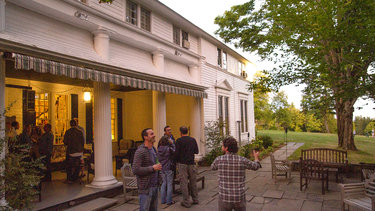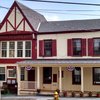Carey Institute conservation easement moves forward amid local pushback
RENSSELAERVILLE — The Mohawk Hudson Land Conservancy expressed formal interest in establishing a conservation easement on the Carey Institute for Global Good’s nearly 100-acre campus, which would limit further development, but some residents fear that the terms won’t be strict enough to truly preserve a property that has long been Rensselaerville’s crown jewel.
The Huyck Road campus was listed for sale last November after the institute, a not-for-profit group dedicated to cultural enrichment that oversaw weddings and other events on the property to sustain itself, was unable to secure new sources of revenue while the coronavirus pandemic halted large in-person gatherings.
Those same fears about the property’s future have apparently prompted the Edmund Niles Huyck Preserve — a not-for-profit which oversees approximately 2,000 acres of land adjacent to the institute for purposes of conservation, education, and research — to withdraw from its role as third-party enforcer to a conservation easement, and prompted Carey Institute trustee Victor Schager to resign from the institute board.
Huyck Preserve President Alexandra van Horne did not return an Enterprise call this week to discuss those concerns, and Schrager told The Enterprise that he could not discuss the matter nor explain why he resigned, citing legal vulnerabilities.
It appears from an April 20 letter written by Carey Institute President and Chief Executive Officer Gareth Crawford to the Huyck Preserve Board that, among other things, the board had hoped that the 45 acres of forested land bordering the preserve would be donated to the preserve, but Crawford wrote that, by giving up that land, the campus would lose its conservation value in the eyes of Mohawk Hudson and the “balance of the 55 acres of campus … [would be] subject to any development that zoning and planning board approvals would permit.”
Other concerns of the preserve board as indicated by Crawford’s letter seem to be rehashed on a website of uncertain origins titled Save the Hamlet, which claims that the easement terms will allow for excessive commercial development on the campus, threatening the “85+ year continuity of conservation and scientific research at the neighboring Huyck Preserve,” along with other impacts to the town, like increased traffic.
The site vaguely suggests that the property will eventually fall into the hands of the Brooklyn-based Gowanus Hospitality Group.
Run by Akiva Reich, who confirmed for The Enterprise this week that he’s interested in the Rensselaerville property, the Gowanus Hospitality Group owns a series of high-end venues in New York City and the Hudson Valley, on which it hosts a variety of events and enterprises.
“As soon as there’s some validity or tangible information I’ll be happy to talk about it,” Reich said, “but at this point it’s a little premature.”
In an open letter posted to the Carey Institute website on April 19, Crawford wrote, “The campus remains for sale on the open market. We have not stopped marketing and are open to discussion with any interested parties. There is no deposit, no contract and no letters of intention that are signed and active with any party.”
Realtor James Male of House Hudson Valley Realty, which lists the property for sale at $2.75 million, declined to comment.
When The Enterprise broke the story in November on the sale of the campus, Crawford said the institute had lost $2 million to $3 million because of the shutdown caused by the pandemic, which began locally in March. However, asked about deficits, he said the center had never been able to pay for itself.
Crawford said in November that the institute planned to put a conservation easement in place before it sells the property. He also said that the institute will continue its work, although he does not yet know where it will be based. The intention is to remain in Rensselaerville, he said.
Easement terms
In his April 19 letter, Crawford outlines the terms of the easement, which are subject to change since no agreement has yet been signed, according to King.
The easement would “prevent all but modest development (25% total additional square footage) only in those areas already developed,” the letter reads. “Any development would be height-limited to be lower than the tree-line (approx. 35 feet). Wooded and open parts of the campus would be permanently protected. It would require that ‘dark sky’ guidelines be adhered to.”
Dark sky guidelines are published by the International Dark-Sky Association to minimize light pollution.
In the letter to the Huyck Preserve Board, Crawford stated that easement also “permits only up to four separate parcels on the approximately 100 acre campus in perpetuity. The four parcels would permit each of the existing residences on the property (Stonecrop, Huyck House, and the Lake View House) to be subdivided from the remaining acreage and sold as single-family residences.”
The letter goes on to say that “the boundaries of the potentially subdivided residential parcels are not fixed; the only limitation on the boundaries are that the potentially subdivided parcels will not include the acreage that cannot be further developed, e.g., the forested areas and the meadows and fields that are to be preserved.”
Crawford told The Enterprise this week that the proposed terms of the easement, which are expected to be in place before a sale is made, have already curbed buyers who would have subjected the property to a level of development higher than what the board of trustees is willing to tolerate.
“I can think of at least one other party whose plans were for significantly more density and would have had a lot more impact on the community,” Crawford said, “and I think the terms of the easement served its purpose [there]. They’re not going forward with their interest.
“I think that’s a point that has not been made public. There is this balance that we’re trying to achieve between the conservation of the property and preserving the nature of the campus, while ensuring that there’s some economic activity.”
King, meanwhile, expressed some confusion over the recent community backlash, calling it an “interesting development in this whole thing” that “seems a little contradictory.”
“Wanting to save [the property] or not save it, which side are we on here?” King asked rhetorically of the grassroots group. “It gets a little confusing.”
King said that Mohawk Hudson’s aim in placing an easement on the property is to protect the “undeveloped open space” that exists there, especially that which sits adjacent to the Huyck Preserve.
“It’s a 90-plus acre property and there’s a considerable amount of land that’s forested and unused that adjoins the Huyck Preserve, so we’d like to protect that,” King said. “And development and activities on the property have an impact on Myosotis Lake, which is a public water supply, and we hope that an easement might reduce or limit impacts on the water supply.”
The Mohawk Hudson Land Conservancy has already protected about 1,520 acres in Rensselaerville.
“We’ve protected a lot of properties in Rensselaerville, most of which surround the hamlet,” said King in November, including the “top of the world” Bolotsky Property, which was protected in 2016. No price had been set then for the Carey campus easement.
The protected Rensselaerville properties are part of the Helderberg Corridor, which stretches from the Catskills to Thacher Park and the Helderberg escarpment.
King has pointed out before that an easement does not open a property to the public. It remains private property on which taxes are paid.
Misinformation
Crawford was keen to address what he called “speculation and misinformation” on the Save the Hamlet site, arguing that such material could be “divisive” and counterproductive to the preservation of the Institute and its campus.
He drew attention to the approximately 60 staffers who had to be laid off because of the hiatus on the sorts of events that Crawford said brought in approximately 66 percent of the institute’s revenue.
“There is this balance that we’re trying to achieve between the conservation of the property and preserving the nature of the campus, while ensuring that there’s some economic activity,” Crawford told The Enterprise. “One of the responsibilities that I have are to staff the people we employ and give salaries and benefits to their families, and we had to lay a lot of those people off because of COVID, and their concerns and voices are legitimate and not necessarily being heard in this conversation either.
“And let me just say, and I speak for the rest of the board, that we do not dismiss the concerns of the people in the hamlet. We don’t want those things either. But there’s a lot of speculation and unsubstantiated claims that don’t really help anybody.”
The Enterprise tried to connect with a number of people who were understood to be aligned with the mission of the anonymous Save the Hamlet website, including Schager and van Horne, but none were willing to discuss their concerns.
Incidentally, Crawford told The Enterprise that, prior to Schrager’s resignation, Schrager was head of a committee made up of two other trustees that was dedicated to finding a suitable not-for-profit buyer.
The Enterprise did, however, speak with Dardis McNamee, who described herself as a “resident and property owner of Rensselaerville” from a family that “has a longtime association with both the Carey Institute and the Huyck Preserve stretching back several generations with plenty of loyalties to go around, and great concern for the future of the hamlet.”
McNamee said, from Austria, she wasn’t part of the Save the Hamlet movement but “knows some of the people in it.”
“Most people are just interested in coming to a good resolution, which is what I hope will happen,” McNamee said, explaining that she recognizes that “things have to change in order to stay the same.”
“The Carey Center couldn’t survive the pandemic. Their major source of revenue was their wedding business and other events that they were accommodating in their facilities, and they haven't been able to do that for over a year now .... and they can’t survive that loss,” McNamee said. “So something has to happen.”
McNamee also expressed concern about misinformation related to the easement and possible development following a sale.
“I guess what concerns me is that people have gotten frightened about what might happen without really informing themselves about the stages,” McNamee said. “But I also think that the Carey Center, until recently, could have done a better job communicating the ideas that they were working on.”



